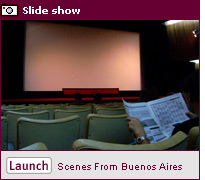Scenes From Buenos Aires
And yet it's also the case that beneath the surface(and not far beneath it at that), an undercurrent of profound anxiety seems to run through the city. Some of it is the product of economic uncertainty. (As Andres di Tella said, "People feel that tomorrow they might be on the street.") Some of it is a fear of crime. (We saw a Japanese couple get robbed in broad daylight near an Armani store in the best part of town. The crime was so brazen, we didn't even recognize it as such: We thought it was a bar fight of sorts, two men struggling over a woman.)
For all their openness, people here are quite literally guarded all the time: A security guard stands in front of our small hotel in Palermo; he opens the door for us, then locks it as soon as we're inside. The Palermo boutiques we visited all had the same routine. And some of the undercurrent of fear is a legacy of the years of dictatorship. "This is an anxiety-ridden country," Pablo Suarez suggested. "The dictatorship left its imprints. People are somehow afraid all the time, as if they're always waiting for those close to them to betray them."
You sense that fear in what is perhaps the single most popular product of the Argentine film boom: the serial TV murder mystery Epitafios, the first subtitled series to air on HBO in the United States and a smash hit in much of South America. Epitafios is glossier than the movies we've been watching and talking about. And it is also trashier, a melodrama centered on a serial killer who foretells his murders by sending the cops a sketch of a tombstone inscribed with an apposite epitaph. But it is also, in its way, artful and compelling, the product of people who have imbibed the lessons of good Hollywood films (Epitafios is explicitly influenced, for instance, by David Fincher's Seven) and then put a distinctive Argentine spin on them. Although Epitafios is set in a nameless South American city, it is clearly the product of a nation coming to terms with its past: The murderer, we learn, is trying to avenge the deaths of four college students who died in a hostage situation gone awry. Renzo, the cop who is the show's reluctant hero, was responsible for the disaster; he has tried to deal with his guilt by hiding in a low-stress job as a cab driver.
Early in our week in Buenos Aires, we sat down with Walter and Marcelo Slavich, two brothers who created the show together. "Renzo was sleeping, and he never really gets time to wake up," the Slaviches told us, over a cafe cortado, the coffee drink of choice here. (It's like a macchiato.) The Slaviches are large, gregarious men in their 40s; they have the same Prussian-blue eyes and wear matching silver rings, a touch that undercuts their formidable presence. "There are many Renzos here," they said, referring to a sense of apathy and defeat in many porteños.
Then, too, there is the legacy of the economy's travails. The problem of money—who has it, who doesn't, how you might get it, how you get by without it—is, in one form or another, inescapable in most movies made in Argentina, even if the message isn't often as explicit as it is in Adrián Caetano's neo-noir A Red Bear, where the anti-hero (played by Julio Chávez, who also plays Renzo in Epitafios) says, "All money is dirty."
The strong, extended family has long been fundamental to Latin American cinema, as critic Dave Kehr recently noted. But in many new Argentine movies, families seem constantly on the verge of dissolution. The best Argentine film we saw at the festival, for instance, was Alexis dos Santos' Glue: Historia Adolescente en Medio de la Nada, a coming-of-age story centered on a sexually ambiguous teenage boy in a dusty industrial wasteland, told in fractured, impressionistic snapshots. The main protagonist and his older sister live aimlessly, wandering through a blasted-out landscape, lusting after their peers or after American culture, falling painfully in love, and idly hoping their adulterous father might return home. The Violent Femmes' "Add It Up"—the song the hero listens to over and over on his Walkman—is nearly as vivid a character here as his mother.
Family is even more central to Lucrecia Martel's La Ciénaga (2001), the atmospheric, sharply told story of a decaying aristocratic family, land rich and cash poor, who have retreated to their shabby country estate for the summer. Martel dislikes being called part of the New Argentine Cinema, perhaps because her ambitions seem global—she's in our minds the most skilled and powerful filmmaker Argentina has produced. La Ciénaga is like Faulkner on white wine: slightly icier and more female but still mythical, incestuous, erotic, and powerfully humid. What is most intriguing about La Ciénaga is precisely what captivates us about Buenos Aires: the combination of surface directness with a deeper secrecy. In La Ciénaga, the family seems volatile, excessive—frankly, almost too open, with all their squabbling and lounging around naked in front of one another. But they hide their secrets as fiercely as pirates guard their treasure or the military its history of jailing student radicals.
On our last few days in Buenos Aires, we stopped in at a number of bookstores, all of them seemingly highbrow—tables full of Lacan, Adorno, and de Certeau, as well as shelves of film criticism. Analysis, whether psycho- or otherwise, is clearly a passion here. (In among the Derrida, by the way, we also spotted translations of Thomas Friedman's The World Is Flat and Malcolm Gladwell's Blink.) There are places in Buenos Aires—like the MALBA, where we attended a cocktail reception before a screening of Martín Rejtman's seminal Rapado—where you feel like you're in New York; it could have been an opening at MoMA, with the same kind of good-looking, well-off people milling around the bar (and security guards telling us not to lean on any of the surfaces). But it's when you're in the bookstores, perusing Jorge Luis Borges or Julio Cortázar, that you do feel the world isn't quite flat yet. For everything familiar, there is something strange, even surrealistic, like the mothers of the disappeared marching in the rain in the Plaza de Mayo.
There may be many Renzos in Buenos Aires, but we didn't meet them. Our stay was marked, above all, by the passionate engagement of the filmmakers and curators we met. Talking to them—and watching a film like Glue—it was hard to feel that New Argentine Cinema is suffering. If it is, from our vantage, it looked mostly like growing pains, ones that will allow it to be reborn in ever new and more complex forms in the coming years.

